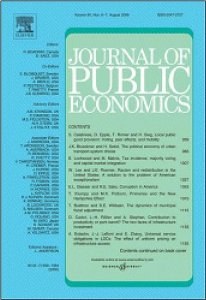
Jacobs, B., Jongen, E. and Zoutman, F. (2017). Revealed social preferences of Dutch political parties Journal of Public Economics, 156:81--100.
-
Affiliated authorsBas Jacobs, Floris Zoutman
-
Publication year2017
-
JournalJournal of Public Economics
{\textcopyright} 2017 Elsevier B.V.We measure the redistributive preferences of Dutch political parties using unique, detailed information from their election proposals. By employing the inverse optimal-tax method, we calculate the political weights across the income distribution for each political party. We find that all Dutch political parties give a higher political weight to middle incomes than to the poor. Moreover, the political weights of the rich are close to zero. Furthermore, we detect a strong political status quo bias as the political weights of all political parties hardly deviate from the weights implied by the pre-existing tax system. We argue that political-economy considerations are key in understanding these results.